|
The Street (Forstal Road 1891 ) )
Egerton
01233 756 304
https://thegeorgeategerton.co.uk/our-story/
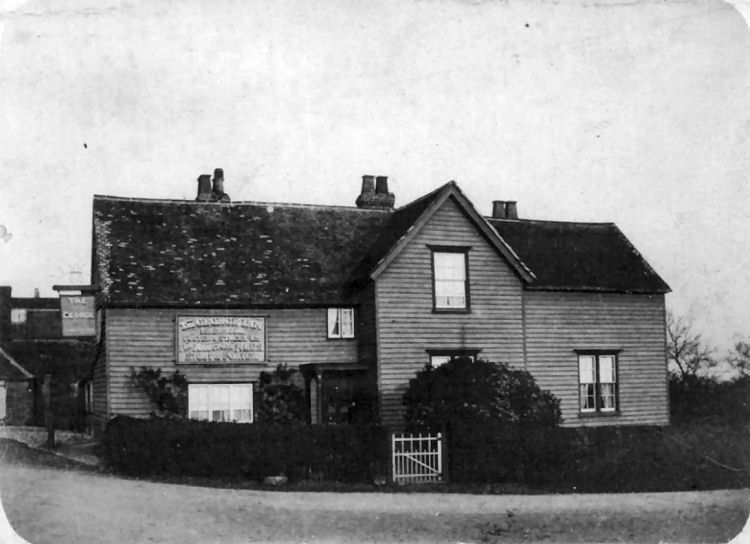
Above postcard, postmarked 1904. |
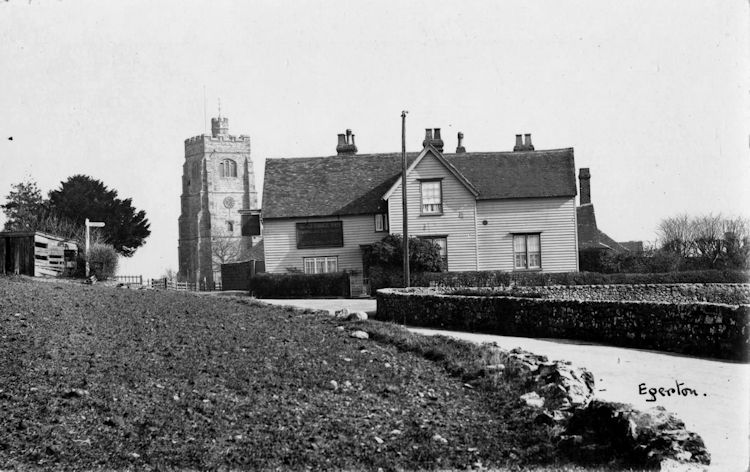
Above postcard, date unknown. |
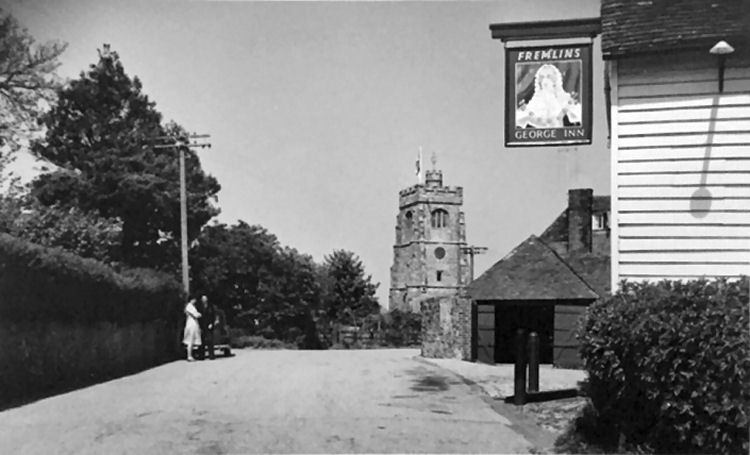
Above postcard, circa 1951, kindly sent by Rory Kehoe. |
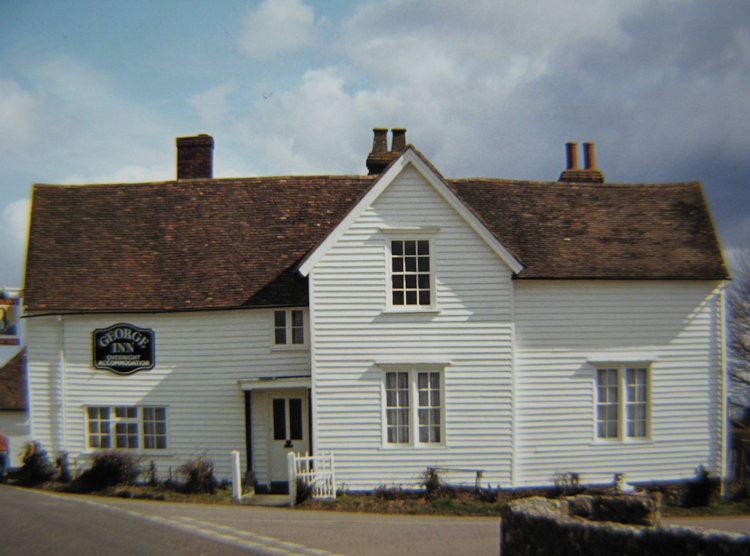
Above photo, 2 April 1986, by Jim Ashby. |
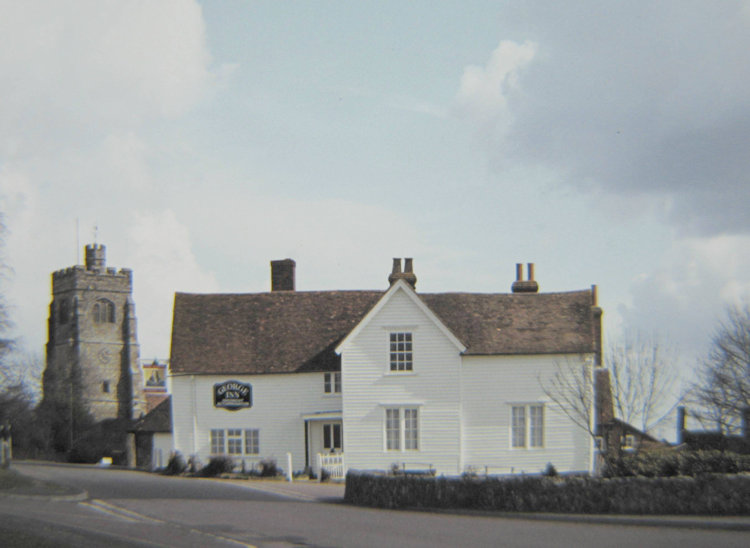
Above photo, 2 April 1986, by Jim Ashby. |
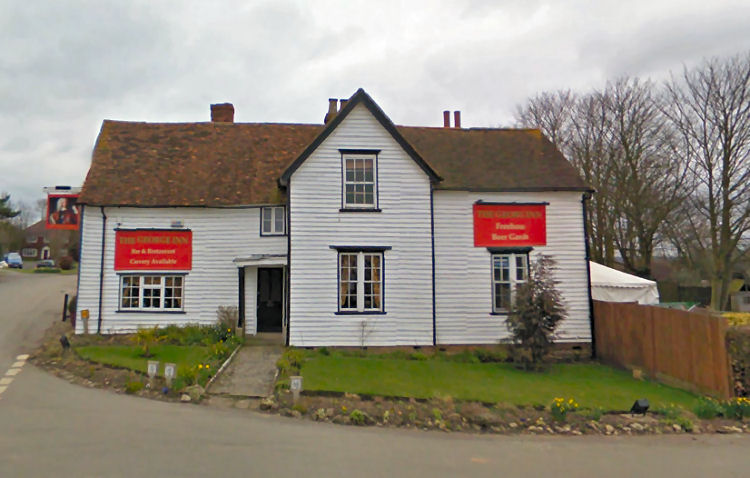
Above Google image, March 2009. |
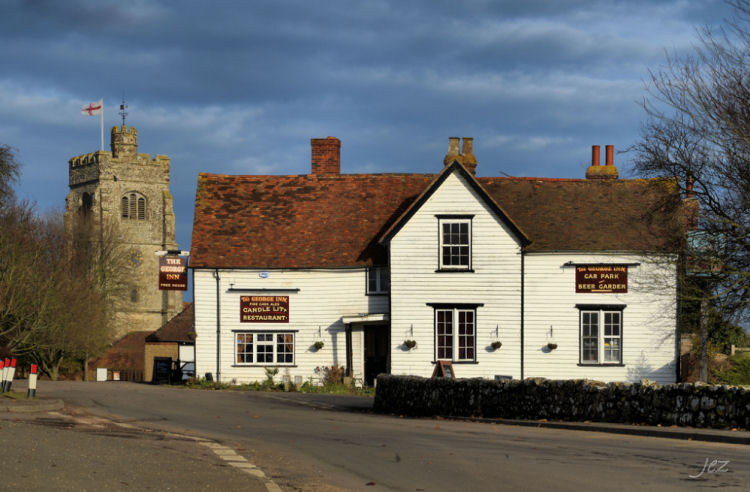 Photo taken 1 September 2010 from
http://www.flickr.com
Jeremy Sage.
|
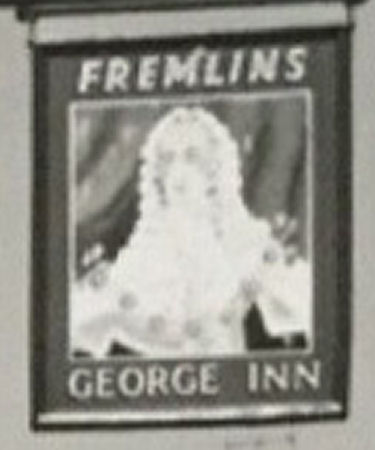 ![]()
Above sign 1951. |
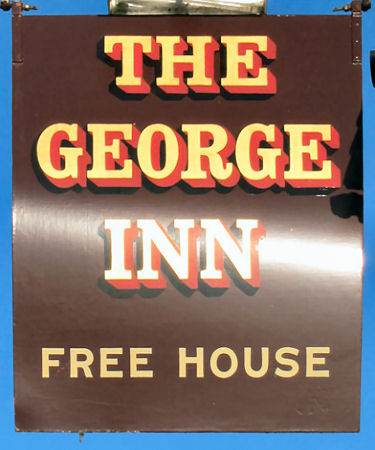 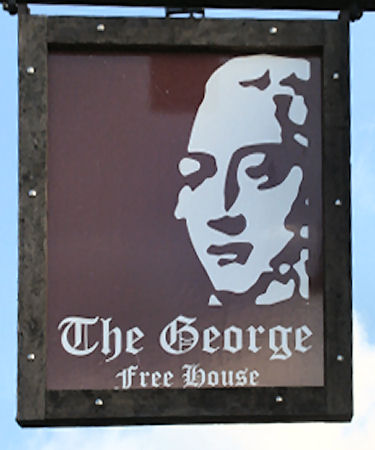
Above sign left, 2011, sign right, 2015. |
The "George Inn" was originally built in 1576 during the reign of Queen
Elizabeth 1st and has been altered and added to over the centuries. A
Richard Turk was first granted a licence to sell ale in 1729 and was granted
a further licence to sell wine in 1743. It was at this time that the pub was
officially registered as The George.
During the second world war the 127 Wing of the Royal Canadian Air Force
Association was based near here and the pilots used he "George" as their
local. When David Drew was landlord in the 70s and 80s he was an honorary
"Red Indian" pilot and gathered mementoes and signatures of pilots. He
displayed these around the pub and many can still be seen today.
|
Kentish Gazette, 25 January, 1870.
A FARMER’S SON CHARGED WITH NIGHT POACHING.
At the Ashford Petty Sessions on Tuesday last, before H. B. Walker,
Esq., (Chairman), tha Earl of Mount Charles, E. C. Dering, and W. D.
Walker Esqrs., Joseph Gore, the son of a farmer at Egerton, was
brought up on a warrant charged with night poaching on the estate of
Sir Edward Cholmoley During, Bart., at Pluckley. Mr. Dering withdrew
from the Bench during the hearing of this case, which drew a large
number of persons to the Court.
The prisoner asked to have the case adjourned, as he should be able
to produce witnesses who would prove an alibi. He said he went down
to Egerton Forstal at seven o'clock in the evening, and had several
games of cards at the house of a young man named George Brunger. He
then went to a beer-shop and had a pint of beer, and thence to the
"George Inn" at Egerton-street, where he remained till twelve
o'clock, and then went home to bed.
The mother of the prisoner said that her son was taken from the
house and driven away in the night, so that there had been no time
to get evidence to answer the charge.
The Bench decided to hear the evidence for the prosecution, and they
could then decide whether an adjournment was necessary.
Robert Sage, under-keeper to Sir Edward Dering, deposed:- On
Saturday night from a quarter to eight to a quarter past eight
o'clock, I heard a gun fire in a piece of wood called Faggoter's
Wood, in the parish of Pluckley, and belonging to Sir Eward Dering.
I ran in the direction from which I heard the gun, and Richard Powle,
who was with me, followed me up. When I was within sixty yards of
the wood, I saw Gore come out of it.—
(Gore:- I was not there at all, so you could not see me come out).
Gore came about fifteen yards towards me, and as soon as he saw who
it was he ran down the road, and I called out, "Stop him down the
road." He then jumped the hedge and ran along a piece of wheat
belonging to Mr. George Barnes, and I pursued him. I got within
about fifteen or twenty yards of him, when he turned round und said,
"Stand back you ------ or else I'll shoot you." He had a double
barrelled gun in his hand. I replied, "All right, Joe; shoot and be
------. I am going to follow you up if I can." He then ran into a
shave and I lost him.
By the Court:- I have known the prisoner for eight years, and I have
no doubt whatever in my mind that it was him I saw and spoke to
about five minutes before I heard the gun fire I saw Gore and a man
named Clarke Wood coming in the direction from Gore's house towards
this wood. I and Fowle laid up in the hedge, and they passed as. I
heard one of them say, "There are some birds (meaning pheasants)
gone up in the firs to-night."
Richard Fowle, deposed to the same effect. The observation about the
birds was made by Gore, as witness knew Gore's voice. They went up
and spoke to Clarke Wood (Gore having then left him in the road),
and in reply to Sage, Wood said he did not know who it was who had
passed. While Sage was pursuing the man who came out of the wood, he
called out "Look out down the shave," and afterwards "Look out down
Monday Boys Wood." Witness, who was following Sage up, accordingly
ran towards Monday Boys Wood, and in a clover ley he saw Joseph Gore
running. Witness got within two yards of Gore, who then turned round
and pointed a gun at witness. Witness held a stick up to push the
gun away, exclaiming, "It’s you, Joe, is it?" Gore then walked off
in the direction of Monday Boys Wood. Witness had known the prisoner
for seventeen or eighteen years, and had no doubt whatever about
him. He was dressed in a twill jacket and cap.
Richard Buss, of Pluckley, labourer, was standing at his door with a
lantern when he heard the gun fire, and in a moment or two some one
coming down the road shouting "stop him." He called his employer,
Mr. Barnes, and they joined in the chase. He heard the man they were
pursuing tell Sage to stand back or he would shoot him, but he did
not identify the man as the prisoner.
The magistrates adjourned the further hearing of the case until
to-day; and the prisoner was liberated on bail, two respectable
persons coming forward as his sureties in £50 each, and he also
entering into his own recognizance in £50.
|
|
Whitstable Times and Herne Bay Herald, 2 July 1870.
QUARRELL AT EGERTON.
At the Ashford Petty Sessions, on Tuesday last, Joseph Gore, son of a
farmer at Egerton, and himself a married man, was summoned for
assaulting Edward Turk. There was a large number of persons from Egerton
and neighbourhood in court to hear the case. The complainant deposed
that he was in the smoking room of the "George Inn," at Egerton, when
defendant came and said he had heard Turk, wanted to fight him, and
although he denied having done so. Gore seized him by the ear, twisted
his head round and struck him several blows in the face, blacking his
eye. A good many witnesses were called on each side, and it appeared
that an ill-feeling existed between the parties in consequence of Turk
having given certain information which had led to a charge of perjury
being preferred against a person who had given evidence on Gore’s
behalf, when the latter was charged with poaching a few months since. It
was said that a man named Smith said Turk had told lies in the matter,
and thereupon Turk pulled Smith’s nose, and Gore, in return, twisted
Turk’s ear. Gore was fined £2 and £1 13s. 6d. costs, which he paid, and
was also bound over, himself in £50 and two sureties of £20 each, to
keep the peace for six months.
|
In December 2016 it changed name to the "Barrow
House" but in 2022 it reverted back to its original name again.
|
From the
https://www.kentonline.co.uk By Max Chesson, 15 December 2025.
George at Egerton landlord’s bid to reopen under membership
subscription scheme.
The landlord of one of Kent’s oldest pubs hopes to reopen the
“financially unviable” boozer with a weekly subscription scheme.
The George at Egerton, near Ashford, has been shut since January
last year, originally due to extensive renovations.
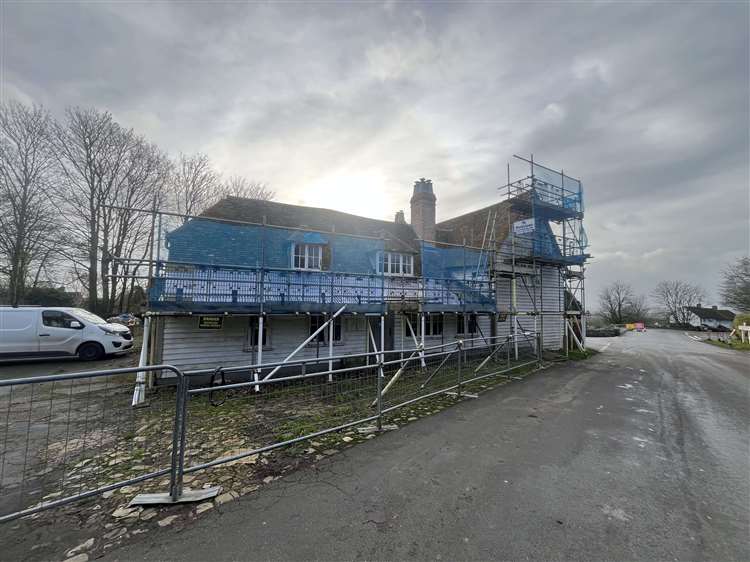
The George in Egerton could reopen under a membership scheme.
However, owner Keith Perkins has recently mooted reviving the
centuries-old inn for paying members only, who live nearby.
The Yalding-based businessman made his fortune in the finance sector
in the UK and Asia before setting up Aero Legends in 2014 at
Headcorn Aerodrome.
In a post on social media, he said: “The particular challenge with
Egerton is that there isn’t much in the way of passing trade, and
the volatility in sales has made it impossible for the pub to be
financially viable.
“The pub costs circa £50k a year to be in a ready state to open
(business rates, insurance, standing charges, licences, alarm
maintenance, winter heating, basic repairs and maintenance, etc) and
that is before any cost of capital or trading costs such as wages,
the cost of stock and power.
“I would love to see the pub reopened and be the centre of the
village, but it has to be on a sustainable basis.
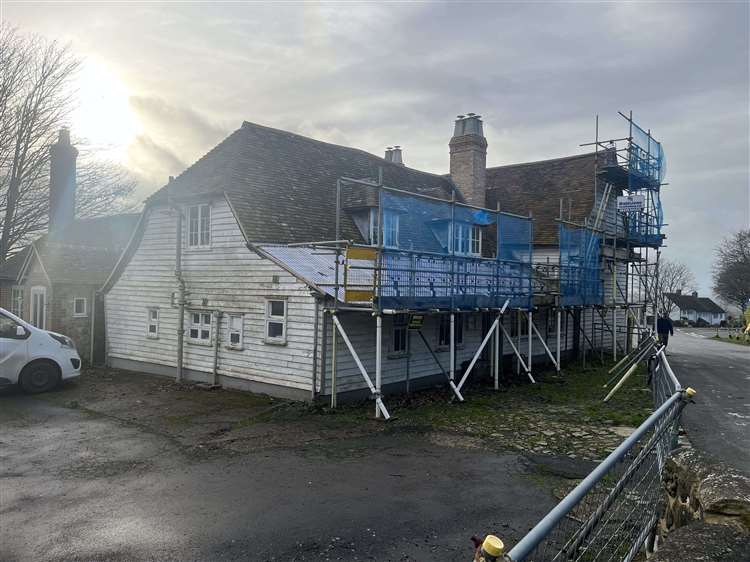
The George in Egerton’s landlord says his pub has become
“financially unviable" in the current financial climate.
“I have looked at the various options, and the one that is most
likely to succeed is where the pub operates as a members' pub with
regular subscriptions. However, this will only work if there is
enough support.
“There are many benefits of a members' pub, one of which would be
that you know who is allowed in and therefore should be a safe
space.
“Drinks prices would be lower than alternative venues and the
facility and rooms would be available for hire by members at lower
rates than elsewhere.”
Keith has said there would need to be a minimum number of members at
any one time, likely to be about 100 people paying £10 a week.
While there is scope for preferential rates, he says “the sums have
to add up” as he prepares to put together a plan to save The George.
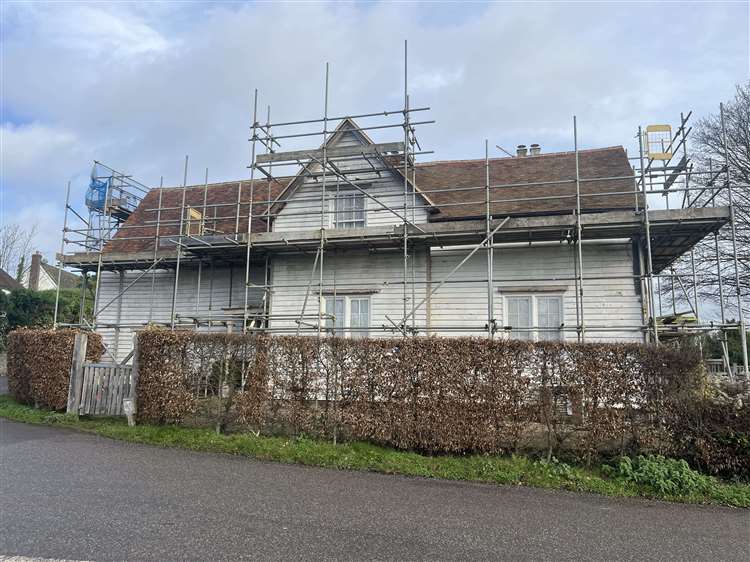
Keith Perkins, landlord of The George in Egerton, is considering
reopening under a members-only scheme.
Mr Perkins said he would hold two invite-only meetings on the
potential model – one yesterday and another tonight at 7pm – for
nearby residents who requested to attend.
To express interest, email keith@aerolegends.co.uk stating in the
email heading, your name, the date you would like to attend and
where you live.
It will also be an opportunity to discuss the building work
undertaken at the pub, which was the original reason for its
closure.
While the first licence to sell ale was granted in 1729, The George
was originally built in 1576.
However, it was only officially registered in 1743, when permission
to sell wine was given.
During the Second World War, the 127 Wing of the Royal Canadian Air
Force Association was based nearby, and the pilots used the pub as
their local.
Mr Perkins has been contacted for comment. |
LICENSEE LIST
TURK Richard 1729-43+ (age 35 in 1841 ) )
AMOS Edward 1851-58+ (age 45 in 1851 ) )
DAVIS David S 1861+ (age 34 in 1861 ) )
ODDEN Edmund 1871+ (age 26 in 1871 ) )
HARRISON Thomas 1881-1903+ (age 78 in 1901 ) )

HARRISON Annie (daughter) 1911-18+ (age 48 in 1911 ) )
WOOD Clarke 1930-38+
DREW David 1970s-80s
https://pubwiki.co.uk/GeorgeInn.shtml
 From the Kelly's Directory 1903 From the Kelly's Directory 1903
 Census Census
|












